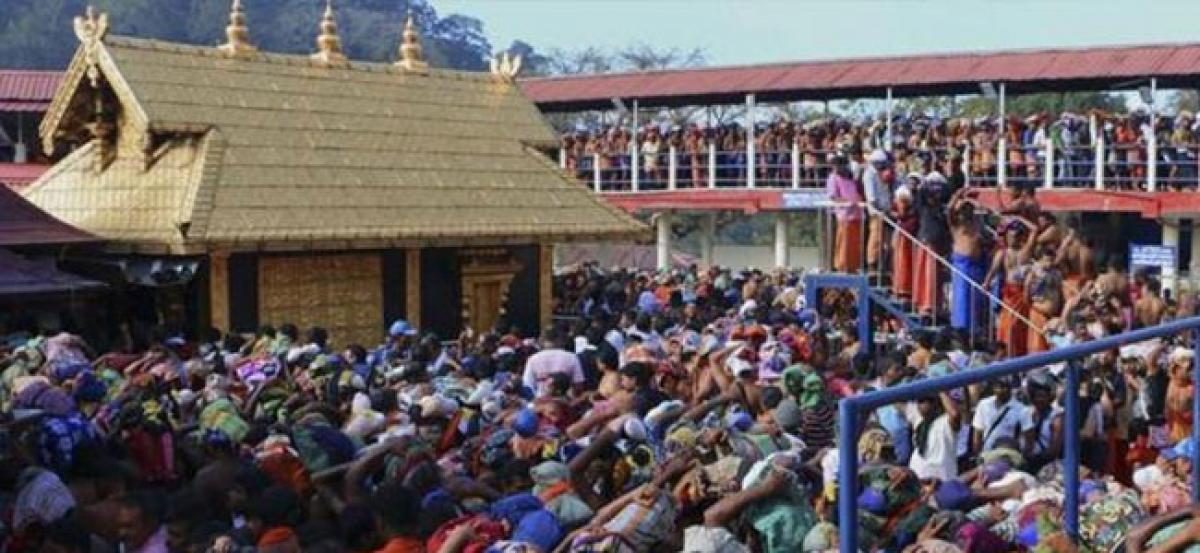Live
- CM Revanth petitions for change in Paleru rly line
- Udupi MP seeks more key highways on top priority
- New diet plan rolled out at welfare hostels
- HRF demands for nation-wide caste census
- SP launches Medicover family health card
- Chiranjeevi Visits Allu Arjun for Lunch Amid Ongoing Legal Turmoil
- Covid ‘scam’ FIR row: Congress pursuing politics of vengeance, says BJP
- Decades-old temple re-opens after 46 years in Sambhal
- Chandrababu to Inspect Polavaram project amid security measures tomorrow
- Aaditya Thackeray Calls For EOW Probe Into Mumbai's Rs 7,000 Crore Road Project
Just In

The Supreme Court on Friday referred to a Constitution Bench the question whether a ban on the entry of women in the age group 10-50 years in Kerala\'s Sabarimala temple on grounds of biological factors was discriminatory and violative of the Constitution\'s Articles 14, 15 and 17.
New Delhi: The Supreme Court on Friday referred to a Constitution Bench the question whether a ban on the entry of women in the age group 10-50 years in Kerala's Sabarimala temple on grounds of biological factors was discriminatory and violative of the Constitution's Articles 14, 15 and 17.
Article 14 guarantees right to equality, Article 15 prohibits discrimination on grounds of religion, race, caste, sex or place of birth, and Article 17 abolishes untouchability and forbids it practice.
A bench of Chief Justice Dipak Misra, Justice R. Banumathi and Justice Ashok Bhushan in its judgment framed five questions to be addressed by the Constitution Bench.
The questions include whether the exclusion of women in the age group of 10 to 50 years based on a biological factors amounts to "discrimination" and violates the very core of Articles 14, 15 and 17 and not protected by 'morality' as used in Articles 25 and 26 of the Constitution?
Asking whether the practice of excluding such women constitutes an "essential religious practice" under Article 25, the court in another question asked "whether a religious institution can assert a claim in that regard under the umbrella of right to manage its own affairs in the matters of religion?"
In another poser, the court has asked whether "Ayyappa Temple has a denominational character" and if it was permissible for religious denomination managed by a statutory board and is funded by the Kerala and Tamil Nadu governments to indulge in practices "violating the constitutional principles/morality embedded in Articles 14, 15(3), 39(a) and 51-A(e)a of the constitution".
In yet another question to be addressed by the constitution bench, the court has asked whether Rule 3 of Kerala Hindu Places of Public Worship (Authorisation of Entry) Rules permits 'religious denomination' to ban entry of women between the age of 10 to 50 years.
It further asked if its Rule 3 permitted the ban on the entry of women in the age group of 10 to 50 years in Sabrimala temple, then would it not be foul of Articles 14 and 15(3), which says that nothing in the provision prohibiting discrimination on grounds of religion, race, caste, sex or place of birth shall prevent the state "from making any special provision for women and children"
The constitution bench will also examine whether Rule 3(b) is ultra vires the Kerala Hindu Places of Public Worship (Authorisation of Entry) Act, 1965, and if not, is it violative of the fundamental rights.

© 2024 Hyderabad Media House Limited/The Hans India. All rights reserved. Powered by hocalwire.com







